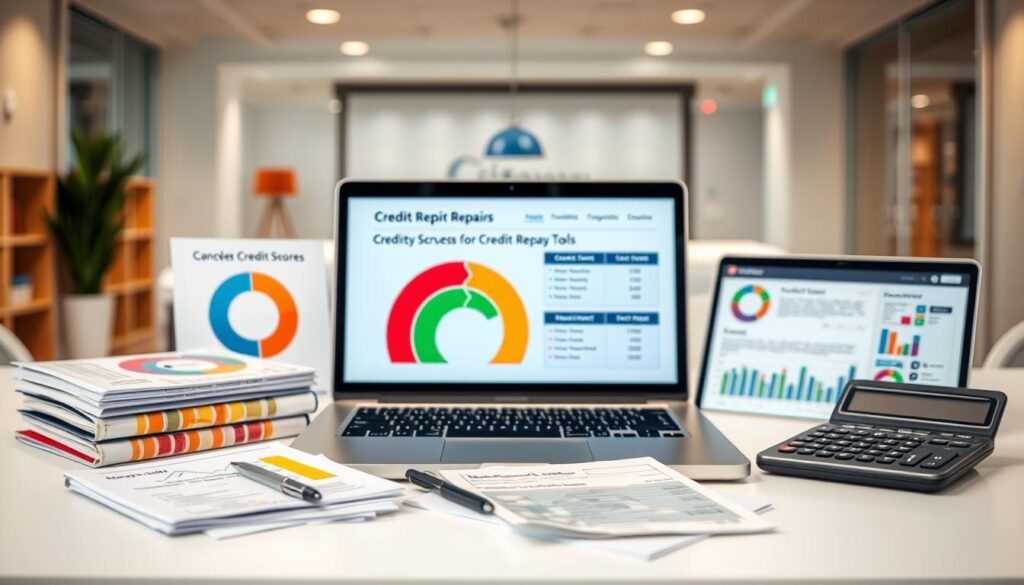Millions face poor credit due to financial mistakes, identity theft, or lack of credit history. The good news? Free resources are available to improve your credit score. These tools can help you take control of your financial future.
You’re not alone in your credit struggles. Many Americans deal with similar issues. Free credit repair resources can guide you towards better financial health.
This guide explores free credit repair options. We’ll cover the basics and strategies for disputing errors. You’ll also learn about rebuilding credit and accessing educational resources.
Our goal is to help you boost your credit score. We’ll show you how to remove negative items from your report. You’ll gain a better understanding of personal finance along the way.
Key Takeaways
- Discover free credit repair resources to improve your credit score
- Learn how to dispute errors on your credit report and remove negative items
- Explore debt management plans and credit counseling services to get your finances back on track
- Utilize credit monitoring tools to stay informed and proactive about your credit health
- Access educational resources, online courses, and guides to build your financial literacy
Understanding Credit Repair
Credit repair fixes errors on your credit report. It’s key to boosting your credit score and credit history. This can greatly impact your financial future.
What is Credit Repair?
Credit repair involves reviewing your credit report for mistakes. It includes disputing wrong info with credit bureaus. You may also negotiate with creditors to improve your credit improvement.
Why is Credit Repair Important?
Your credit score affects loans, credit cards, housing, and jobs. Good credit unlocks better financial chances. It can help you get lower interest rates.
Better rates can save you money over time. This makes credit repair a smart financial move.
Maintaining a healthy credit score is essential for financial well-being and success.
Credit repair helps you control your money future. It can open doors to a more secure financial life.

Free Credit Report Analysis
Reviewing your credit report is vital for credit repair. Many companies offer free credit report analysis services. These insights can guide your efforts to improve your credit.
A thorough credit report analysis helps identify errors or negative items. It assesses your credit score, payment history, and credit utilization. These factors impact your creditworthiness.
Understanding your credit report’s strengths and weaknesses is crucial. It helps you create a strategy to boost your credit score. A free analysis provides powerful tools for credit repair.
| Service | Description | Cost |
|---|---|---|
| Credit Karma | Provides a free credit report and score analysis, along with personalized recommendations for improving your credit. | Free |
| Experian | Offers a free credit report and score, as well as a detailed analysis of your credit profile and personalized tips for credit improvement. | Free |
| TransUnion | Provides a free credit report and score, along with a comprehensive analysis of your credit history and suggestions for credit repair. | Free |

A free credit report analysis helps you understand your credit situation. It’s the first step towards better financial health. Use these resources to get a clear picture of your credit profile.
Disputing Errors on Your Credit Report
Spotting mistakes on your credit report? You can challenge those errors. This process can boost your creditworthiness. Let’s look at how to dispute credit report errors effectively.
How to Dispute Errors
First, gather proof that supports your claim. This may include bills or statements contradicting your credit report. Then, start your dispute with the credit bureaus.
Contact the bureaus in writing. Explain the errors clearly and provide your supporting documents. Follow their specific instructions for submitting a dispute.
Keep a record of your dispute. Note the date, how you communicated, and any reference numbers given.
- Contact the credit bureau(s) in writing, clearly explaining the errors you’ve identified and providing the supporting documentation.
- Follow the credit bureau’s specific instructions for submitting a dispute, which may include completing a dispute form or uploading your documents through their online portal.
- Be sure to keep a record of your dispute, including the date, the method of communication, and any reference numbers provided by the credit bureau.
What to Do After Disputing Errors
The credit bureau must investigate within 30 days. Stay alert and track your dispute’s progress. Check for updates from the bureau.
Make sure errors are fixed or removed from your report. If not resolved, you can add a dispute statement to your report.
Still unhappy? Contact the Federal Trade Commission or your state’s consumer protection agency.
- Review any updates or responses from the credit bureau, and ensure that the errors have been properly corrected or removed from your credit report.
- If the credit bureau’s investigation fails to resolve the issue, you have the right to submit a statement of dispute that will be included in your credit report.
- If the dispute is not satisfactorily resolved, consider escalating the matter by contacting the Federal Trade Commission or your state’s consumer protection agency.
Disputing credit report errors is key to a healthy credit report. It can boost your credit score. By following the credit report dispute process, you’ll improve your financial future.
credit repair help free
Want to boost your credit score? Plenty of free resources can help. Online guides, tutorials, and credit counseling services offer valuable support without any costs.
Start by exploring free credit repair resources. These include guides on disputing credit report errors and building good habits. Many are available online, making them easy to access from home.
Non-profit credit counseling agencies also offer credit repair assistance. They provide free or low-cost services like credit report reviews and personalized action plans. These agencies can be great for those needing hands-on support.
For more in-depth learning, check out free online courses on credit repair resources. They cover topics from credit scoring basics to advanced rebuilding strategies. These free materials help you take control of your finances.
| Free Credit Repair Resources | Key Benefits |
|---|---|
| Online Guides and Tutorials | Comprehensive information on credit repair strategies, available at no cost |
| Non-Profit Credit Counseling Services | Personalized support and guidance on credit management and debt resolution |
| Educational Courses and Workshops | In-depth knowledge on credit building, financial literacy, and money management |
Use these free credit repair resources to improve your credit score. You can achieve your financial goals without expensive professional services. Explore your options and start working towards a brighter financial future today.

Rebuilding Your Credit
Rebuilding credit requires patience and dedication. With the right approach, you can boost your credit score and history. These proven techniques can help you rebuild credit, practice credit building, and achieve credit history improvement.
Strategies for Rebuilding Credit
Become an authorized user on someone else’s credit card. This lets you benefit from their positive credit history. Make sure the primary cardholder maintains good credit habits.
Try using a secured credit card. These cards need a refundable security deposit as your credit limit. Make on-time payments to show responsible credit building.
- Become an authorized user on someone else’s credit card
- Use a secured credit card and make on-time payments
- Maintain a low credit utilization ratio (the amount of credit you use compared to your total credit limit)
- Apply for a credit-builder loan, which reports your payments to credit bureaus
- Monitor your credit report regularly and dispute any errors or inaccuracies
Rebuilding credit takes time, but don’t get discouraged. Stay committed to good credit building habits. Your credit history improvement will happen gradually with consistent effort.

Credit Counseling Services
Credit counseling services offer valuable help for managing debt and improving credit. These nonprofits provide affordable guidance on budgeting and credit improvement. They can help you create a plan for financial stability.
A key benefit is debt consolidation into one manageable payment. Counselors negotiate with creditors to lower interest rates and fees. This makes paying off debts easier for you.
They also offer financial education to boost your money management skills. This knowledge helps prevent future debt problems. Credit counselors assist with credit repair too.
They can help dispute errors on your credit report. They also develop strategies to improve your credit score. This helps those who’ve faced financial setbacks like job loss or medical bills.
“Credit counseling services have been a game-changer for me. They not only helped me get my debt under control but also provided valuable insights on budgeting and credit management that have set me up for long-term financial success.”
If you’re struggling with debt, consider a credit counseling service. They provide guidance to regain control of your finances. With their help, you can work towards achieving your financial goals.
Debt Management Plans
A debt management plan can help you handle credit card debt effectively. These plans are offered by credit counseling agencies. They aim to reduce interest rates and monthly payments while consolidating your debts.
How Debt Management Plans Work
Debt management plans negotiate with your creditors to get better terms. This often includes lower interest rates and simpler monthly payments. Here’s how they work:
- Enrollment: You’ll work with a credit counselor to assess your financial situation and determine if a debt management plan is the best solution.
- Debt Consolidation: The counselor will contact your creditors to combine your outstanding credit card debt into a single, manageable monthly payment.
- Interest Rate Reduction: The counselor will negotiate with your creditors to lower your interest rates, often significantly reducing the overall cost of your debt consolidation.
- Simplified Payments: Instead of juggling multiple due dates and payment amounts, you’ll make a single monthly payment to the credit counseling agency, which will then distribute the funds to your creditors.
A debt management plan can save you money on interest. It can also improve your credit score. This happens by making on-time payments and reducing your overall debt.
| Benefit | Description |
|---|---|
| Lower Interest Rates | Debt management plans can negotiate with creditors to significantly reduce the interest rates on your credit card debt. |
| Simplified Payments | Instead of juggling multiple payments, you’ll make a single monthly payment to the credit counseling agency. |
| Improved Credit Score | By making on-time payments and reducing your overall debt, a debt management plan can help improve your credit score over time. |
Are you struggling with credit card debt? A debt management plan might help. It can streamline payments and reduce interest costs. Consider it as part of your credit repair journey.
Credit Monitoring Tools
Regular credit monitoring is key to maintaining good credit health. Various tools can help you track your credit profile and guard against identity theft. These tools offer crucial features to keep your finances secure.
Credit report tracking is a vital feature of these tools. They review reports from Experian, Equifax, and TransUnion for changes or suspicious activity. This helps you spot and fix errors or fraudulent accounts quickly.
Identity theft protection is another important aspect. Many services alert you to new accounts, address changes, and other potential theft signs. This allows for quick action to prevent major credit damage.
Both free and paid credit monitoring options exist. Free services offer basic monitoring and alerts. Paid services may include more features like score tracking and dark web monitoring.
Regular credit checks are crucial for financial health. They help protect you from credit-related issues. Choose a tool that fits your needs and budget.
| Feature | Free Credit Monitoring | Paid Credit Monitoring |
|---|---|---|
| Credit Report Tracking | ✓ | ✓ |
| Identity Theft Protection | Basic | Comprehensive |
| Credit Score Tracking | Limited | ✓ |
| Dark Web Monitoring | No | ✓ |
| Identity Theft Insurance | No | ✓ |
“Regularly monitoring your credit is one of the best ways to protect yourself from identity theft and maintain a healthy financial profile.”
Credit Education Resources
Boosting your financial know-how can transform your credit repair efforts. Free online courses and guides are available to help. These resources cover credit scoring, budgeting, and debt management.
With knowledge, you’ll be better prepared to manage your finances. You can take control of your financial future. Learning about credit is a powerful step forward.
Online Courses and Guides
The internet offers many educational materials on credit and finance. Platforms like Udemy, Coursera, and edX provide engaging online courses. These cover credit repair, budgeting, and debt reduction.
Financial institutions and nonprofits offer free resources too. You can find interactive guides and informative articles. These help explain credit and financial wellness.
Using these resources will deepen your understanding of credit systems. You’ll learn practical steps to boost your credit score. You’ll also develop skills for making smart financial choices.
Investing time in financial education is valuable. It’s a powerful tool in your credit repair journey. This knowledge sets you up for long-term financial success.

